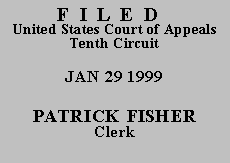

| RAYMOND GENE MIDDLETON, |
|
| v. | |
| HOWARD RAY, |
Petitioner-Appellant Raymond Gene Middleton, an Oklahoma state inmate appearing pro se, seeks a certificate of appealability in order to appeal from the district court's denial of his petition for a writ of habeas corpus filed pursuant to 28 U.S.C. § 2254. The district court determined that his petition was untimely under the Anti-Terrorism and Effective Death Penalty Act (AEDPA), 18 U.S.C. § 2244(d), and dismissed the action.
Following a jury trial in Oklahoma state court, Middleton was convicted and sentenced in 1995 on one count of manslaughter in the first degree and on one count of feloniously pointing a weapon. Since no direct appeal was completed,(1) at the latest, Middleton's state conviction became final on January 16, 1996, before the effective date of the AEDPA. Accordingly, unless the § 2244 limitations period was tolled, Middleton had until April 23, 1997, to file his federal habeas petition. United States v. Simmonds, 111 F.3d 737, 746 (10th Cir. 1997).
Six days before the expiration of the limitations period, on April 17, 1997, Middleton filed a state court application for post-conviction relief, and that application tolled the running of the limitations period during the pendency of the state collateral proceedings, until September 30, 1997, when the Oklahoma Court of Criminal Appeals affirmed the state district court's denial of the petition,(2) 28 U.S.C. § 2244(d)(2); see Hoggro v. Boone, 150 F.3d 1223, 1226 (10th Cir. 1998). Thus, after the Oklahoma Court of Criminal Appeals ruled, Middleton had six days in which to file his federal petition. Hoggro, 150 F.3d at 1226. Since Middleton did not file his petition in federal court until December 3, 1997, well past the tolled period, the district court correctly found that the filing was untimely. In addition, we agree with the magistrate judge's further conclusion, which the district court adopted, that Middleton has not shown any recognized basis for equitable tolling.(3)
Because Middleton has failed to make "a substantial showing of the denial of a constitutional right," 28 U.S.C. § 2253(c)(2), we DENY his request for a certificate of appealability and DISMISS the appeal.
ENTERED FOR THE COURT
Stephen H. Anderson
Circuit Judge
*.This order and judgment is not binding precedent, except under the doctrines of law of the case, res judicata, and collateral estoppel. The court generally disfavors the citation of orders and judgments; nevertheless, an order and judgment may be cited under the terms and conditions of 10th Cir. R. 36.3.
1.Middleton contends that he was denied effective assistance of counsel because, through no fault of Middleton's, his counsel withdrew before completing the appeal. Inasmuch as the petition is untimely, we dismiss without reaching the merits of the claim.
2.Middleton sought no further state court relief.
3.We note that, in his appellate brief, Middleton makes several arguments on this point which he did not make before the district court, and which we therefore do not consider. Walker v. Mather (In re Walker), 959 F.2d 894, 896 (10th Cir. 1992).